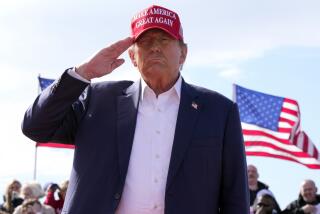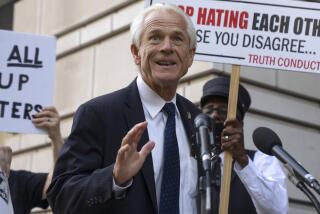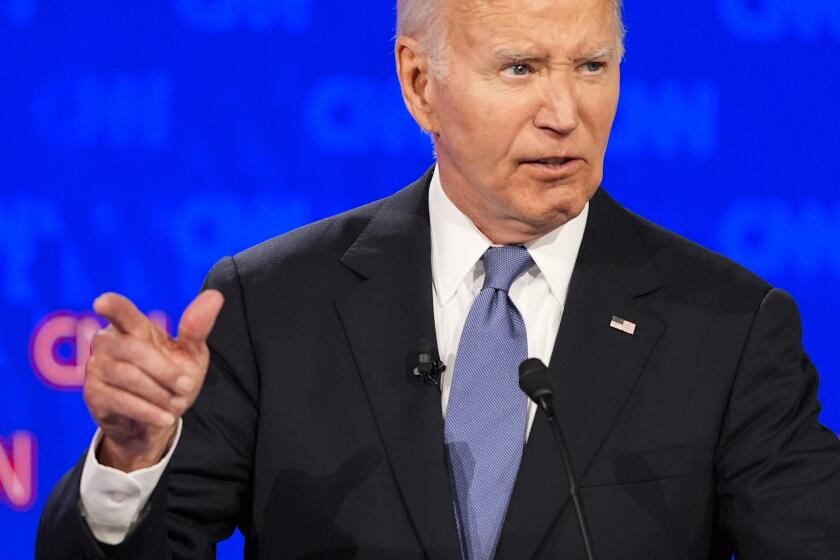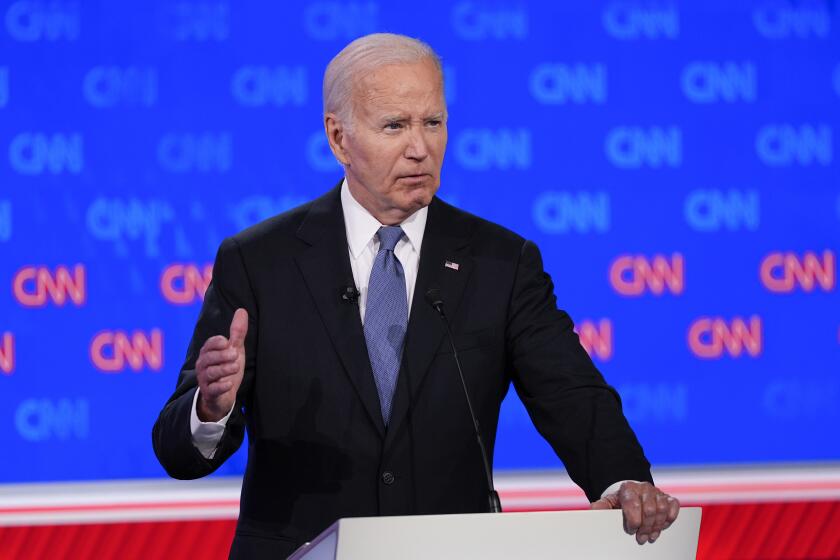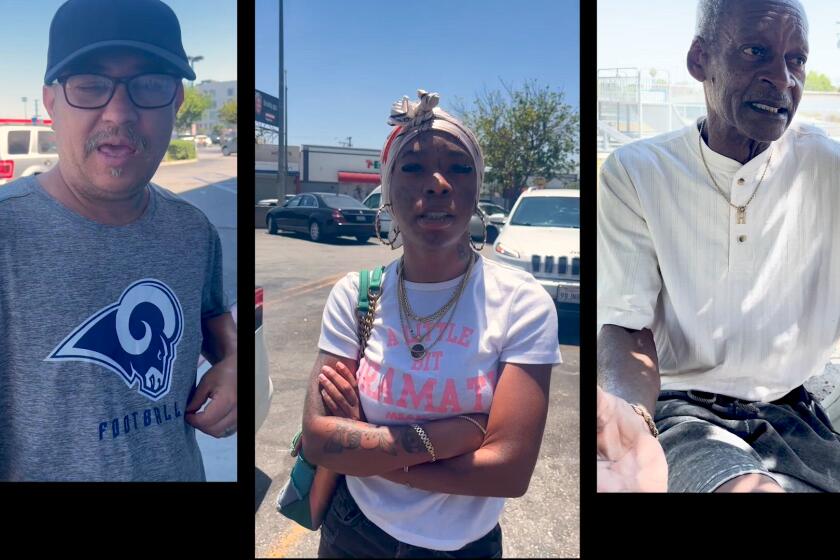Trump subpoenaed by House Jan. 6 committee

The House Jan. 6 panel has argued that Trump’s efforts to stay in power led to the insurrection. He is expected to challenge the subpoena.
The House Jan. 6 committee issued a subpoena Friday to former President Trump, calling him the “central cause” of a coordinated effort to overturn the results of the 2020 election.
Committee members voted unanimously at their Oct. 13 hearing to subpoena the former president as part of their investigation into what led to the Capitol insurrection on Jan. 6, 2021. The subpoena, which was sent to his lawyers Friday along with a letter outlining the committee’s findings, orders Trump to produce documents by Nov. 4 and appear for what could be a multiday deposition under oath by 10 a.m. Nov. 14.
“As demonstrated in our hearings, we have assembled overwhelming evidence, including from dozens of your former appointees and staff, that you personally orchestrated and oversaw a multi-part effort to overturn the 2020 presidential election and to obstruct the peaceful transition of power,” the letter states.
Over months of hearings, the committee has argued that blame for the insurrection should be placed squarely on Trump’s efforts to stay in power despite knowing he had lost the election. Though the subpoena contains a significant amount of detail about what the committee is seeking from the former president, it could end up being largely symbolic because of time constraints.
In its letter, the committee again lays out its case and accuses Trump of maliciously spreading false information that the 2020 election was stolen despite knowing it was false; attempting to corrupt the Justice Department; pressuring state officials to change election results; and overseeing an effort to submit false election result certificates to the National Archives. It also accuses him of pressuring then-Vice President Mike Pence to illegally reject state electors, filing false information in court, and inciting violence at the Capitol and refusing to send supporters home.
“In short, you were at the center of the first and only effort by any U.S. president to overturn an election and obstruct the peaceful transition of power, ultimately culminating in a bloody attack on our own Capitol and on the Congress itself,” the letter states.
David A. Warrington, a partner at Dhillon Law Group, the California-based firm Trump tapped to handle the subpoena, called releasing the subpoena unprecedented.
“We understand that, once again, flouting norms and appropriate and customary process, the committee has publicly released a copy of its subpoena. As with any similar matter, we will review and analyze it, and will respond as appropriate to this unprecedented action,” Warrington said.
The committee has previously announced subpoenas it was issuing and released accompanying letters, but has generally not released a list of requested documents or the actual subpoena.
The committee’s letter, which was signed by its chair, Rep. Bennie Thompson (D-Miss.), and vice chair, Rep. Liz Cheney (R-Wyo.), instructs Trump to produce documents in 19 categories including messages sent by Trump or that Trump ordered to be sent on Jan. 6; all communications or notes from conversations he had with members of Congress between election day and Jan. 6; and notes or memos about the presidential election, the scheme to have fake electors submit false election certificates and the Jan. 6 joint session of Congress. Some of the requests cover the period between the election and the Capitol riot, and others reach back to September 2020 before the election.
Communications that occurred on the Signal messaging application are repeatedly singled out by the panel, which also asked Trump to produce communications on personal devices as well as memos or notes made from those conversations. The committee has also requested “information sufficient to identify every telephone or other communications device” that Trump used from Nov. 3, 2020, to Jan. 20, 2021.
The letter asks for communications about his campaign’s election lawsuits, Pence’s role on Jan. 6, about far-right militias the Oath Keepers and the Proud Boys and communications with members of Congress about contesting certification of the election.
A broad request for all communications or memos about conversations or planning with key outside players in the committee’s investigation, such as former Trump advisors Stephen K. Bannon, Roger Stone and Michael Flynn, and with attorneys including Sidney Powell, John Eastman and Rudolph W. Giuliani, is also included in the letter. The committee specifically asks Trump to provide any notes about his “possible travel to the Capitol that day” and about communications with former Secret Service agent and White House Deputy Chief of Staff Anthony Ornato.
The letter also suggests that the committee is pursuing allegations that Cheney made at a hearing about efforts to tamper with the committee’s work, asking Trump for all documents and communications that refer to its investigation, including attempts to contact witnesses or their attorneys, information about paying their legal fees or offers to find them employment.
Multiple former presidents have testified before Congress, a fact noted by the committee in its letter to Trump. But most have done so voluntarily. This is just the second time in modern U.S. history that Congress has issued a subpoena in an attempt to compel testimony from a president. In 1953, then-President Truman refused to obey a subpoena from Congress, but voluntarily testified multiple other times before leaving office.
“We recognize that a subpoena to a former president is a significant and historic action,” Thompson and Cheney wrote. “We do not take this action lightly.”
Trump has not said whether he will provide documents and testimony as required, but he is expected to challenge the subpoena. He could choose to comply, negotiate with the committee, announce he will defy the subpoena or ignore it. He could also go to court and try to stop the committee from enforcing it.
The day after the committee voted last week to issue the subpoena, Trump decried the panel’s actions in a rambling post on his social media platform, Truth Social, but did not address how he intended to respond.
Cheney said at an event at the Harvard Kennedy School’s Institute of Politics this week that if Trump refused to comply, the committee would “take the steps we need to take” without elaborating on what those steps would be.
With just over two months left before the committee is expected to finish its work, any fighting over logistics around Trump’s possible appearance means there is a diminishing chance that the public might hear firsthand from the former president as part of the committee’s final report.
The committee has had mixed success in persuading the Justice Department to charge those who have refused to testify or supply documents to the panel. Two of the four people the House has voted to hold in contempt, Bannon and Peter Navarro, a former White House trade advisor, were indicted. The Justice Department declined to charge Trump’s former Chief of Staff Mark Meadows and aide Dan Scavino Jr.
Bannon was sentenced Friday to four months in prison and a fine of $6,500. Navarro’s trial is scheduled for next month.
After interviewing more than 1,000 people and collecting hundreds of thousands of documents, the committee is expected to produce a fulsome report of its investigation by the end of the year. Thompson has said that barring new information, the committee does not expect to hold more public hearings.
Republicans are expected to disband the committee if they take control of the House in 2023.
More to Read
Get the L.A. Times Politics newsletter
Deeply reported insights into legislation, politics and policy from Sacramento, Washington and beyond. In your inbox three times per week.
You may occasionally receive promotional content from the Los Angeles Times.

